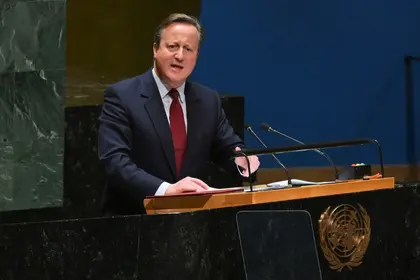UK Foreign Secretary David Cameron said London is contemplating lending Russian central bank assets held in the UK to Ukraine, which it could recuperate from Russian reparations paid to Kyiv following the war's end.
"There is an opportunity to use something like a syndicated loan or a bond that effectively uses the frozen Russian assets as a surety to give that money to the Ukrainians, knowing that we will recoup it when reparations are paid by Russia," Lord Cameron told the House of Lords on Tuesday, March 5.
JOIN US ON TELEGRAM
Follow our coverage of the war on the @Kyivpost_official.
Cameron emphasized the importance of securing consensus within the G7 and EU on this initiative.
However, he indicated a willingness to proceed with supportive allies if broader unity proves elusive. He also reassured that the proposed plan would not tarnish London's financial reputation.
The proposal arises amid ongoing debates within the G7 regarding the feasibility of seizing Russian assets without destabilising the global financial system.
While the US supports the plan, there is less enthusiasm for it within the EU.
If implemented, the plan could offer vital assistance to Ukraine, particularly if it encounters challenges securing aid from the US Congress. It would provide Ukraine with resources for defense and other essential needs.
Nevertheless, there are doubts about Russia's willingness to pay reparations, especially if Ukraine does not win the war.
Since the onset of hostilities, Western nations have frozen approximately €280 billion of Russian assets, primarily held in the Euroclear depository in Brussels.

When the West’s Stupidity Prevents Ukraine’s Victory
The European Commission proposes utilising profits from these assets to bolster Ukraine's defence industry, acknowledging the significant economic losses the country has suffered due to the conflict, estimated at $499 billion by the World Bank.
You can also highlight the text and press Ctrl + Enter






